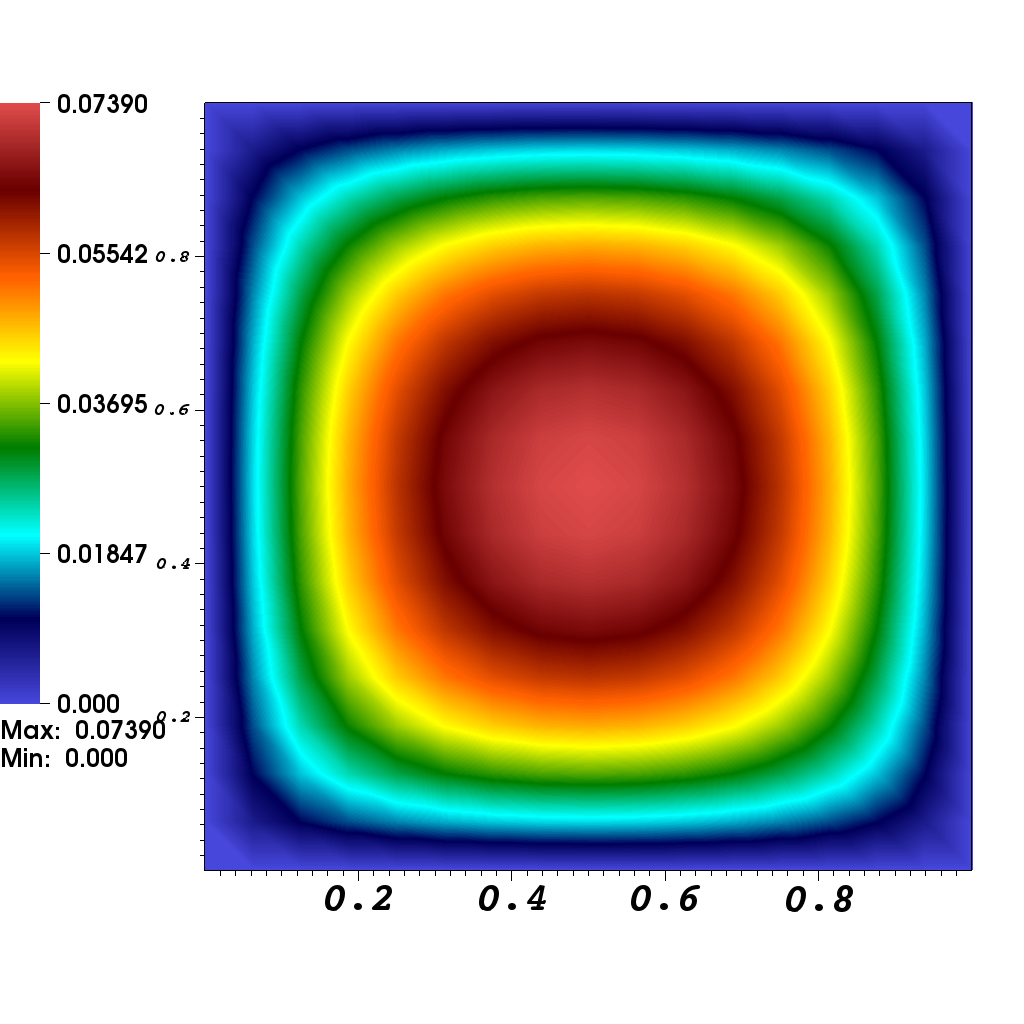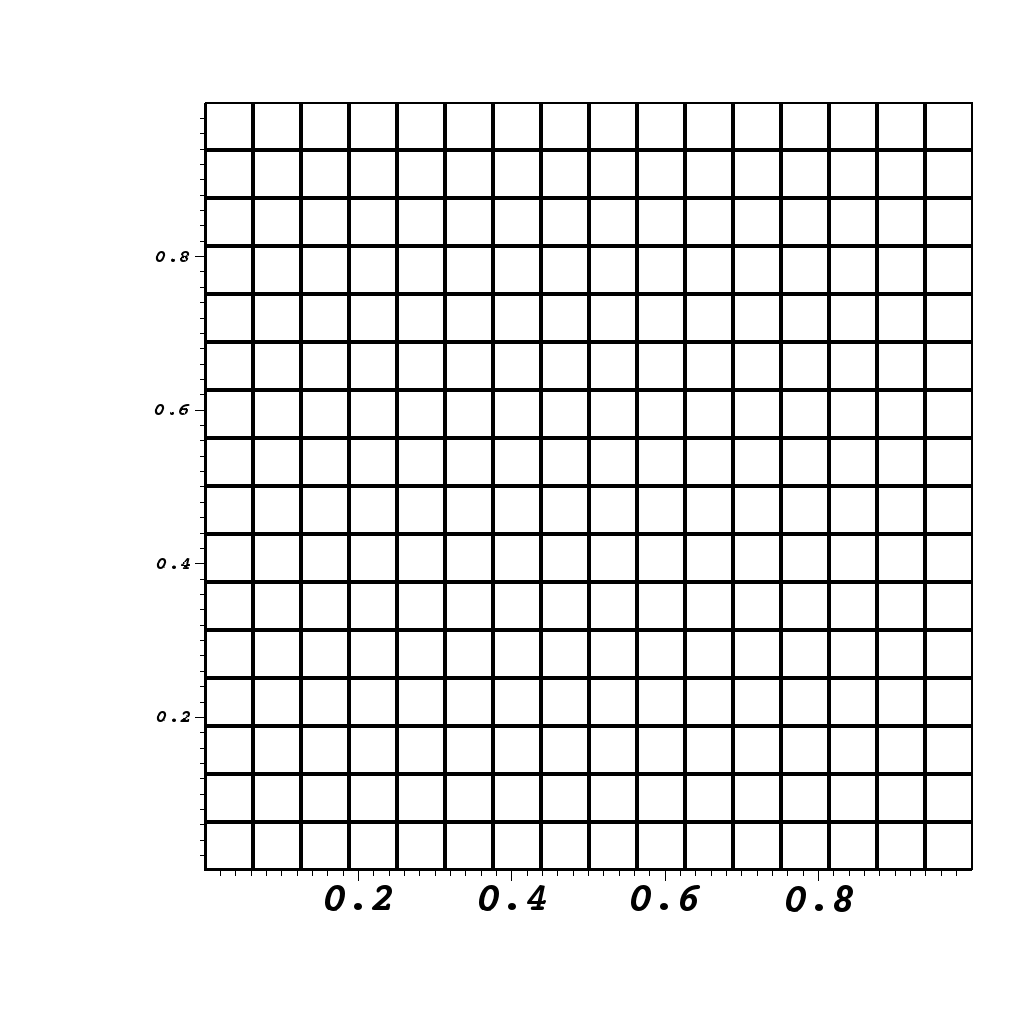Numerics of partial differential equations
International open class: IntNumPDE
Course number at LUH: 10116
Winter 2020/2021 at Leibniz University Hannover
♦Financial and administrative support:
- PeCCC - Peruvian Competence Center of Scientific Computing
- DAAD (German Academic Exchange Service)Leibniz University Hannover International Office
♦News (last update Apr 10, 2021):
Apr 10, 2021:Video on the Lax-Milgram lemmaJan 26, 2021:Meeting 14 (Questions and Quiz)
Dec 22, 2020:Video explaining Galerkin orthogonality and Cea's lemma
Dec 15, 2020:Video meeting 10
Dec 08, 2020:Video meeting 9a
Dec 08, 2020:Video meeting 9b
Nov 22, 2020:Link to further materials for Exercise 6 (week Nov 23-27)
Nov 17, 2020:Video explaining finite elements
Nov 14, 2020:Video 20 minutes lecture 2 (Oct 20, 2020)
Nov 14, 2020:Video summary lecture 1 (Oct 13, 2020)
Nov 11, 2020:Video explaining PDEs and their classification
Oct 27, 2020:Video explaining finite differences
Oct 27, 2020: Updated lecture notes (Chapter 17: Poisson 2D in python)
Oct 14, 2020: Updated lecture notes: Chapter 17 Software (NEW), extended some parts in Chapter 2 after yesterday's lecture, corrected mentioned typos in Section 3.8
Sep 29, 2020: (Slight) update (Chapter 2) of lecture notes
Sep 12, 2020: Handwritten outline
♦Edited lecture notes:
Jan 26, 2021: Meeting 14 (Questions and Quiz)Jan 19, 2021: Edited lecture notes L21 to L26 (Chapter 10 and 12)
Jan 12, 2021: Edited lecture notes L21 to L24 (Chapter 10 and 12)
Jan 05, 2021: Edited lecture notes L21 to L22 (Chapter 10)
Dec 01, 2020: Edited lecture notes L1 to L16
Nov 24, 2020: Edited lecture notes L1 to L14
Nov 17, 2020: Edited lecture notes L1 to L12
Nov 10, 2020: Edited lecture notes L1 to L10
Nov 03, 2020: Handwritten notes Meeting 4
Nov 03, 2020: Edited lecture notes L1 to L8
Oct 27, 2020: Edited lecture notes L1 to L6
Oct 20, 2020: Handwritten notes Meeting 2
Oct 20, 2020: Edited lecture notes L1 to L4
Oct 13, 2020: Handwritten notes Meeting 1
Oct 13, 2020: Edited lecture notes L1/2
♦Exercise sheets:
- Exercises for Peruvian participants take place Tue/Wed, 16h15 - 17h45 CET (9h15 - 10h45 Peruvian time) starting Oct 20/Oct 21, respectively.
Jan 12, 2021: Exercise Sheet 11
Jan 05, 2021: Exercise Sheet 10
Dec 15, 2020: Exercise Sheet 9
Dec 08, 2020: Exercise Sheet 8
Dec 01, 2020: Exercise Sheet 7
Nov 24, 2020: Exercise Sheet 6
Nov 17, 2020: Exercise Sheet 5
Nov 10, 2020: Exercise Sheet 4
Nov 03, 2020: Exercise Sheet 3
Oct 27, 2020: Exercise Sheet 2
Oct 13, 2020: Exercise Sheet 1
♦Registration for Peruvian participants:
Registration♦Overview:
This course is devoted to the numerical solution of partial differential equations (PDEs). A PDE is a function of at least two independent variables in which both derivative information and function values may appear. PDEs play a very important role in continuum mechanics for modeling applications in physics, biology, chemistry, finance, mechanical/civil/environmental engineering. The focus in this course is on numerical modeling of PDEs, which allow us to discretize them for computer simulations. We discuss various discretization schemes, design of algorithms and their rigorous numerical analysis. Moreover, we discuss the numerical solution of the arising linear equation systems. This class is an important part of scientific computing eduction in which mathematical modeling, numerical methods, and computer implementations interact.♦Audience / Prerequisites:
The prerequisites are lectures in calculus, linear algebra and an introduction to numerics. Classes on the theory of ordinary (ODE) or partial (PDE) differential equations are useful but not mandatory. Classes in continuum mechanics may also be helpful, but are also not mandatory.♦Time period (German winter semester):
Oct 12, 2020 - Jan 29, 2021♦Format:
- Self-studies with the help of the provided materials (per week materials for in total 2x90 minutes will be distributed)
- Mixture with live elements and live discussions (approx. every two weeks on Tue or Wed, 90 minutes)
- Weekly live exercises (90 minutes)
- t.b.a: the online/video tool for live elements will be announced begin September 2020.
♦Workload:
- 10 ECTS (European Credit Transfer and Accumulation System)
- Lecture materials and live lectures: 180 minutes per week
- Weekly exercises 90 minutes
- Preparing individually yourself solutions to exercise questions
- Consolidation of the contents in self studies or local team work
- Number of classes: 26-28 lectures (L) in the entire semester
- Number of exercises: 13-14
♦Contents:
- L1: Recapitulation of characteristic concepts of numerical mathematics
- L2-L3: Brief review of mathematical modeling of differential equations
- L4: Classifications
- L5-L8: Finite differences (FD) for elliptic boundary value problems
- L9-L20: Finite elements (FEM) for elliptic boundary value problems
- L21-L23: Numerical solution of the discretized problems
- L24-L26/27: Methods for parabolic and hyperbolic problems (time-dependent PDEs)
- L28: Recapitulation of contents
- If time permits: Numerical methods for nonlinear and coupled problems
♦Literature:
| 1) | T. Wick;
Numerical Methods for Partial Differential Equations Hannover : Institutionelles Repositorium der Leibniz Universität Hannover, 369 pages, 2020. DOI: https://doi.org/10.15488/9248 | Link | ||||
| 2) | Further literature (classical/famous and more recent) can be found in Chapter 1 of Ref. 1) above | |||||
| 3) | P. Bastian, T. Wick;
PeC3 Spring School on Introduction to Numerical Modeling with Differential Equations Hannover : Institutionelles Repositorium der Leibniz Universität Hannover, 2019. DOI: https://doi.org/10.15488/6427 DOI: Pre-course DOI: Exercises PeCCC - Peruvian Competence Center of Scientific Computing | Link | ||||
| 4) |
Basics in numerical mathematics: A. Quarteroni, R. Sacco, F. Saleri; Numerical Mathematics Springer, 2nd edition, 2007 DOI: 10.1007/b98885 | Link |
♦ Exam/Evaluation for local Hannover students:
Mid/end February 2021♦ TAs:
Jan Philipp Thiele, Julian Roth, Max Schröder, Gina Kleinsteinberg♦Contact:
Design by freecsstemplates

